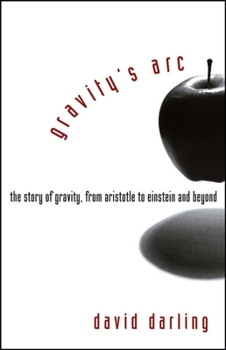Gravity's Arc: The Story of Gravity from Aristotle to Einstein and Beyond
Select Format
Select Condition 
Book Overview
"A beautifully written exposition of the still mysterious force that holds our universe together--and the even more mysterious dark twin that may blow it apart."
--Joshua Gilder, coauthor of Heavenly Intrigue "A lucid book as up-to-date as the effect of gravity on the bones of astronauts."
--Denis Brian, author of The Unexpected Einstein How did they do it? How did one of the greatest geniuses who ever lived stunt...
Format:Hardcover
Language:English
ISBN:0471719897
ISBN13:9780471719892
Release Date:May 2006
Publisher:Trade Paper Press
Length:288 Pages
Weight:0.94 lbs.
Dimensions:1.0" x 5.9" x 8.5"
Customer Reviews
2 ratings
A definite "must read"
Published by Thriftbooks.com User , 15 years ago
We all take it for granted, but begin to struggle when it comes to explaining the principles to our children and grand-children. Darling has a rare gift: to present and explain in part complex issues in such manner that the average reader can easily follow the line of thought. A delightful tour d'horizon, well presented, and definitely worth reading. To the reviewer who took issue with the presentation of the role of the Roman Catholic Church: Sadly enough, Darling is entirely accurate in his historic review of the role of the Roman Catholic Church, and my only concern is that Darling omitted to mention that the same Roman Catholic Church took well over 300 years before it eventually acknowledged that its inquisitorial findings on Galilei had been wrong.
Comprehensive and easy to read.
Published by Thriftbooks.com User , 17 years ago
Needed a book on the history of gravity and this book did well. In the book Gravity's Arc, I found the way the relationship between the Catholic Church and the scientific community, during the middle ages, was conveyed as offensive and biased. "As Europe plunged into the Dark Ages, the only body of knowledge that was tolerated was the sterile, unchanging dogma approved by the Church. It's hard to imagine the utter rigidity of life and thought in those barren times..." (Darling 30). Because the Church had so much responsibility in every aspect of life at the time it had to be very careful about what it deemed right or not. "The Church, sensitive to Protestant charges that the Catholics did not pay proper regard to the Bible, hesitated to permit the suggestion that the literal meaning of scripture--which at times appeared to imply a motionless earth--should be set aside in order to accommodate an unproven scientific theory" (Woods 72). When Galileo began to spread the Copernican theory, this "singular and sterile body of knowledge" told Galileo "that he must cease to teach the Copernican theory as true, though he remained free to treat it as a hypothesis" (Woods 73). St. Albert the Great recognized the value in science, "The sublimest wisdom of which the world could boast flourished in Greece. Even as the Jews knew God by the scriptures, so the pagan philosophers knew Him by the natural wisdom of reason, and were debtors to Him for it by their homage. (Guillen 30).






